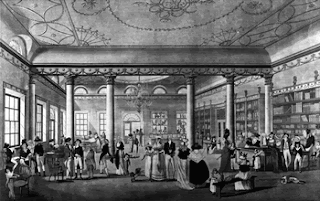Because work, travel, and family obligations have slowed my reading, it's taken me three weeks, but I've re-read it all, and it's been worth it. I've described the tetralogy a bit before, and if you want a more thorough explanation, this review from 2000 in the Boston Review does about as good a job of explaining Crowley's project as I can imagine. I've written before about what a surprisingly small role books and reading play in most fiction--relative, at least, to the role they play in my life and, I trust, those of most writers--and what struck me most in re-reading Aegypt was how utterly wrapped up in stories, and therefore books, the whole series is. Crowley presents his characters, led by his protagonist Pierce Moffett, as preternaturally aware of the way that we use stories to understand the world--and how those stories then shape, or even create, the world they describe. Old stories bleed into new, trace elements of discarded myths linger like junk DNA in our individual understandings of our everyday lives, and even the simple act of recognizing those inherited parameters and archetypes can influence our subsequent decisions.
Yet to feel yourself too strongly to be a character in a story, with feats to perform, prizes to win, and momentous decisions to make is also to be reminded constantly that the story could have gone differently, that a seemingly ordinary decision could be responsible for moving your story from the comedic or the heroic to the tragic. It can be paralyzing, and Crowley's protagonist, Pierce Moffett, spends most of the tetralogy suspended in that sort of uncertainty, wondering about what it is he is supposed to be doing and what sort of story he's supposed to be living. For three novels Pierce spins a variety of alternate theories of the history of the world, of the persistence of magic into our own age, and Crowley travels right along with him, showing us magic in many forms, most of them attempts to achieve power or deny inevitable loss--through wealth, sex, religion, pity, even parenthood. Crowley and Pierce step right up to the edge of promising us secret, forbidden knowledge, hinting that they have a key to understanding the hidden, occult history of the world--the sort of understanding (and, thus, power) that is tempting even to us rational skeptics.
The achievement of Endless Things is, without denying or damaging what has come before, to convince us that it was all just another story--and stories, after all, are the original, crucial magic, the only kind that we as a society can't do without. But, Crowley argues convincingly, on an individual level stories can be limiting, a distraction. We can live our lives wrapped up in books--thank goodness--but we have to remember, along the way, to actually live those lives. In Endless Things Pierce finally realizes that he must take Prospero's road and abjure his magic. The only real secret knowledge was the hope of a secret knowledge itself; realizing that, Pierce is finally willing to accept the uncertainties and finalities of existence and simply plunge into the business of living.
Which returns me to the point I made in writing a few weeks ago about Crowley's reading at KGB: for all its complexity, its heady ideas, layers of self-reference, and its interweaving of different times, places, and myths, Aegypt is about people, their decisions and their fates. That's what all good stories are about, after all, what keeps us reading, hoping to see these lives, so real, so similar in many ways to our own, set into a form that allows for understanding. Even if that understanding primarily consists of accepting that the complexity of life is beyond our ken, our desires will at least be gratified with an end to the story; the lives therein, messy as they may be, as messy even as our own, will be allowed the clarity and dignity that accrues to any ending. As Crowley says late in Endless Things:
Endings are hard. Everybody knows. It's probably because in our own beginningless endless Y-shaped lives things so rarely seem to end truly and properly--they end, but not with The End--that we love and need stories: rushing toward their sweet conclusions as though they rushed toward us, our eyes damp and breasts warm with guilty gratification, or grinning in delight and laughing at ourselves, and at them too, at the impossible endings; we read and we watch and we say in our hearts, This couldn't happen, and we also say, But here it is, happening.




